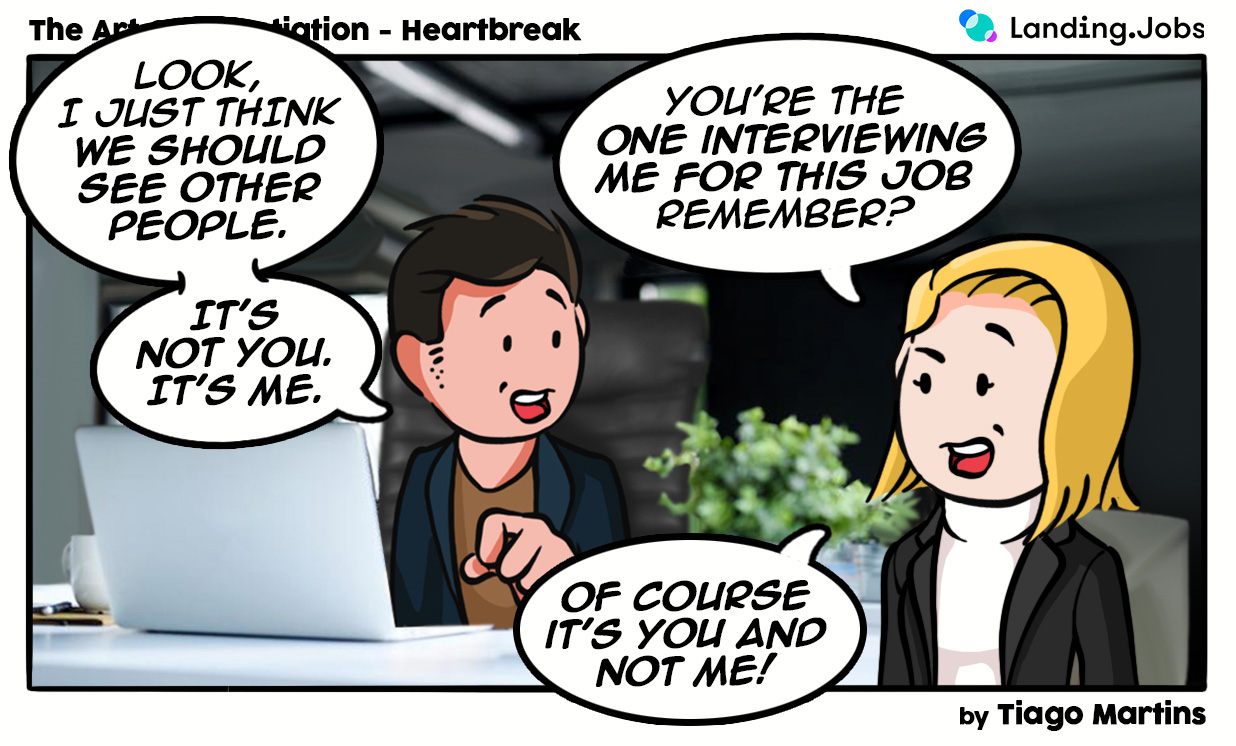Job hunting can be challenging, and getting rejected can make it a disheartening process.
Undoubtedly, receiving a job rejection after putting time and effort into a job application can be demoralising. However, it’s important to (always) keep in mind that a job application rejection is a normal part of the job search journey, and how you handle it can make all the difference in your success.
So, how should you deal with it and turn the situation around?
Dealing with a job application rejection 101
For starters, nothing better than to understand the basics.
Job hunting by itself is crazy. A true jungle where the fight for survival is real. But job hunting in the tech world can be even tougher. Given the tech talent shortage and the high demand, everyone must be on their best to stand out among the crowd and to make the cut.
So, yes, job hunting presents lots of challenges and being rejected is a possibility (a highly probable one)! But it’s how you face it and how you overcome it that might help you to stand tall in the following job interview and become the chosen one.
Nowadays, recruiting processes, although faster and more optimised (with online procedures and assessments, in most cases), are also more demanding, as they force professionals to stay constantly competitive, which can be harder given how information rolls out and the professionals’ skills length is increasingly deeper.
Given this, as long as you understand that job rejection is a natural part of the process and you gear up for it, you will make the most out of it and become readier and stronger for the next step.
5 tips to face a job application rejection and overturn it
We could just start numbering a list of (considered to be) inspirational quotes from some important names of history for you to use as some kind of mantra.
“Failure is only the opportunity to begin again more intelligently”, said Henry Ford, the American industrialist and business magnate, founder of Ford Motor Company.
Thomas Edison (the inventor of the phonograph, the motion picture camera and the early version of the electric light bulb) has said: “I have not failed. I’ve just found 10,000 ways that won’t work”.
These are just two examples, a quick online search about failure inspirational quotes, and you’ll find a number of them. Although we are not here to list these kinds of quotes, we are taking on them to lead you to the main focus of this article.
Yes, facing a job rejection is not nice, and it can be demoralising, but it’s not the end of the world. In fact, it can be a learning opportunity. Sounds cliché, we know, but it’s actually true.
It’s how you face the rejection of the job application and how you rebound from it that might help you be better prepared for the next one.

Landing.Jobs newsletter comic by Tiago Martins
Here are some tips for you to turn things around:
1. Place your head in the right mindset
First things first. Job rejection can trigger a wide range of emotions. Disappointment, frustration, self-doubt, etc. Yes! But it’s crucial for you to understand, acknowledge and validate these as a natural response to rejection. However, more important than accepting this is to not dwell on them for too long and try to move on. Shift your focus towards taking positive steps to move forward.
2. Feedback will be your best friend
Asking for feedback is crucial when dealing with job rejections, and if we’re talking about tech recruitment, it’s even more imperative.
Walk with us on this one. Tech recruitment often involves technical assessments, right? So, just imagine that it was a small mistake that cost you the job. And if it wasn’t that, you’ll know what it was.
This will help you to think about what you might have missed and learn from it to avoid it in future recruitments. Also, by getting this feedback, you can realise you were not a good fit for the role or for the company. So, remember, the more detailed and technical the feedback, the better.
3. Review your application and reflect on it
Now you know what could have gone wrong or why you weren’t fit for the job, so just learn from it. Think about the feedback you just got, and go through everything (starting from the application, the way you researched and prepared for the recruitment process, all the way to the final steps of the recruitment process).
Rank your performance in each stage, find out where there is room to improve and work on that.
If you realize that most times you’re getting rejected right on the CV screening stage and you’re not even getting interviews, then it’s important to stop and critically look at your CV and the jobs you’re applying for. There can be so many reasons why you’re not advancing to the next stage, but some of them might be a lack of the essential skills for the role and a CV that is hard to assess quickly by recruiters.
If it’s your CV that’s the problem, show it to some friends and family, preferably people in your own professional area, and ask them what they would improve. Generally, CVs shouldn’t go beyond one page, some exceptions excluded, so make sure the information is clear, concise and visually appealing.
If it’s a lack of skills for the jobs you’re applying for, you need to critically assess the job descriptions before applying. Is your CV reflecting what the company is looking for? How can you stand out from other applicants? Maybe you need to build a strong portfolio, maybe you need certifications. Whatever it is, pinpoint where you could improve.
4. Keep your skills updated
By now, you get that a job rejection – although it’s not nice – might give you some clues of improvement you might need.
Working on your skills, especially for tech professionals, is essential. Just think about it. Technology is an ever-evolving field, and the better way for you to stay ahead is to be better prepared than your opponents.
So, keep your skills as updated as possible. Preferably, try to get some skills that might not be as usual as they should on the industry you’re trying to get in.
5. Talk to your peers
You are not alone on this. Recruitment processes can be tough, especially nowadays in this job market. You are not the only one going through a job rejection.
Just ask your peers. Whether you do it personally or online, learn from them. What has cost them a job, what they’ve done wrong (and avoid doing so), how they came back from it, and how they improved. This is solid feedback for you as well.
Go online for tech forums and websites where tech professionals talk about these things and get valuable insights.






0 Comments